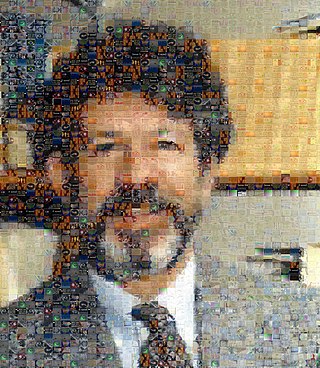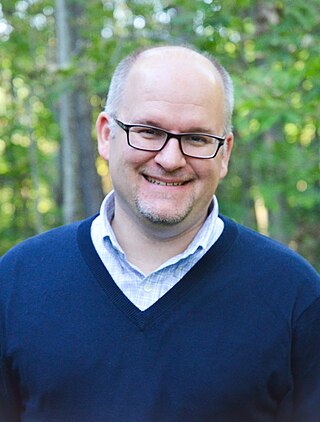Related Research Articles

Statistics is the discipline that concerns the collection, organization, analysis, interpretation, and presentation of data. In applying statistics to a scientific, industrial, or social problem, it is conventional to begin with a statistical population or a statistical model to be studied. Populations can be diverse groups of people or objects such as "all people living in a country" or "every atom composing a crystal". Statistics deals with every aspect of data, including the planning of data collection in terms of the design of surveys and experiments.
A case study is an in-depth, detailed examination of a particular case within a real-world context. For example, case studies in medicine may focus on an individual patient or ailment; case studies in business might cover a particular firm's strategy or a broader market; similarly, case studies in politics can range from a narrow happening over time like the operations of a specific political campaign, to an enormous undertaking like world war, or more often the policy analysis of real-world problems affecting multiple stakeholders.

Educational Testing Service (ETS), founded in 1947, is the world's largest private educational testing and assessment organization. It is headquartered in Lawrence Township, New Jersey, but has a Princeton address.

Computational economics is an interdisciplinary research discipline that combines methods in computational science and economics to solve complex economic problems. This subject encompasses computational modeling of economic systems. Some of these areas are unique, while others established areas of economics by allowing robust data analytics and solutions of problems that would be arduous to research without computers and associated numerical methods.
Quantitative psychology is a field of scientific study that focuses on the mathematical modeling, research design and methodology, and statistical analysis of psychological processes. It includes tests and other devices for measuring cognitive abilities. Quantitative psychologists develop and analyze a wide variety of research methods, including those of psychometrics, a field concerned with the theory and technique of psychological measurement.
Donald Bruce Rubin is an Emeritus Professor of Statistics at Harvard University, where he chaired the department of Statistics for 13 years. He also works at Tsinghua University in China and at Temple University in Philadelphia.

Shlomo S. Sawilowsky was a professor of educational statistics and Distinguished Faculty Fellow at Wayne State University in Detroit, Michigan, where he has received teaching, mentoring, and research awards.

Michael Louis Friendly is an American-Canadian psychologist, Professor of Psychology at York University in Ontario, Canada, and director of its Statistical Consulting Service, especially known for his contributions to graphical methods for categorical and multivariate data, and on the history of data and information visualisation.
Process tracing is a qualitative research method used to develop and test theories. Process-tracing can be defined as the following: it is the systematic examination of diagnostic evidence selected and analyzed in light of research questions and hypotheses posed by the investigator. Process-tracing thus focuses on (complex) causal relationships between the independent variable(s) and the outcome of the dependent variable(s), evaluates pre-existing hypotheses and discovers new ones. It is generally understood as a "within-case" method to draw inferences on the basis of causal mechanisms, but it can also be used for ideographic research or small-N case-studies. It has been used in social sciences, as well as in natural sciences.
Causal analysis is the field of experimental design and statistics pertaining to establishing cause and effect. Typically it involves establishing four elements: correlation, sequence in time, a plausible physical or information-theoretical mechanism for an observed effect to follow from a possible cause, and eliminating the possibility of common and alternative ("special") causes. Such analysis usually involves one or more artificial or natural experiments.
Clark N. Glymour is the Alumni University Professor Emeritus in the Department of Philosophy at Carnegie Mellon University. He is also a senior research scientist at the Florida Institute for Human and Machine Cognition.
Causal inference is the process of determining the independent, actual effect of a particular phenomenon that is a component of a larger system. The main difference between causal inference and inference of association is that causal inference analyzes the response of an effect variable when a cause of the effect variable is changed. The study of why things occur is called etiology, and can be described using the language of scientific causal notation. Causal inference is said to provide the evidence of causality theorized by causal reasoning.

Guido Wilhelmus Imbens is a Dutch-American economist whose research concerns econometrics and statistics. He holds the Applied Econometrics Professorship in Economics at the Stanford Graduate School of Business at Stanford University, where he has taught since 2012.
Mark Johannes van der Laan is the Jiann-Ping Hsu/Karl E. Peace Professor of Biostatistics and Statistics at the University of California, Berkeley. He has made contributions to survival analysis, semiparametric statistics, multiple testing, and causal inference. He also developed the targeted maximum likelihood estimation methodology. He is a founding editor of the Journal of Causal Inference.

Stephen Lawrence Morgan is a Bloomberg Distinguished Professor of Sociology and Education at the Johns Hopkins University School of Arts and Sciences and Johns Hopkins School of Education. A quantitative methodologist, he is known for his contributions to quantitative methods in sociology as applied to research on schools, particularly in models for educational attainment, improving the study of causal relationships, and his empirical research focusing on social inequality and education in the United States.
Paul R. Rosenbaum is the Robert G. Putzel Professor Emeritus in the Department of Statistics and Data Science at Wharton School of the University of Pennsylvania, where he worked from 1986 through 2021. He has written extensively about causal inference in observational studies, including sensitivity analysis, optimal matching, design sensitivity, evidence factors, quasi-experimental devices, and the propensity score. With various coauthors, he has also written about health outcomes, racial disparities in health outcomes, instrumental variables, psychometrics and experimental design.

Michael Barrett Woodroofe was an American probabilist and statistician. He was a professor of statistics and of mathematics at the University of Michigan, where he was the Leonard J. Savage Professor until his retirement. He was noted for his work in sequential analysis and nonlinear renewal theory, in central limit theory, and in nonparametric inference with shape constraints.
Causal analysis is the field of experimental design and statistical analysis pertaining to establishing cause and effect. Exploratory causal analysis (ECA), also known as data causality or causal discovery is the use of statistical algorithms to infer associations in observed data sets that are potentially causal under strict assumptions. ECA is a type of causal inference distinct from causal modeling and treatment effects in randomized controlled trials. It is exploratory research usually preceding more formal causal research in the same way exploratory data analysis often precedes statistical hypothesis testing in data analysis

Tyler J. VanderWeele is the John L. Loeb and Frances Lehman Loeb Professor of Epidemiology in the Departments of Epidemiology and Biostatistics at the Harvard T.H. Chan School of Public Health. He is also the co-director of Harvard University's Initiative on Health, Religion and Spirituality, the director of their Human Flourishing Program, and a faculty affiliate of the Harvard Institute for Quantitative Social Science. He holds degrees from the University of Oxford, University of Pennsylvania, and Harvard University in mathematics, philosophy, theology, finance, and biostatistics.
Robert E. Kass is the Maurice Falk University Professor of Statistics and Computational Neuroscience in the Department of Statistics and Data Science, the Machine Learning Department, and the Neuroscience Institute at Carnegie Mellon University.
References
- 1 2 Paul Holland at National Academy of Education
- ↑ "Paul Holland - The Mathematics Genealogy Project". www.genealogy.math.ndsu.nodak.edu. Retrieved 2023-05-05.
- ↑ Daniel H. Robinson (2005) "Profiles in Research: Paul W. Holland", Journal of Educational and Behavioral Statistics 30(3): 343-350